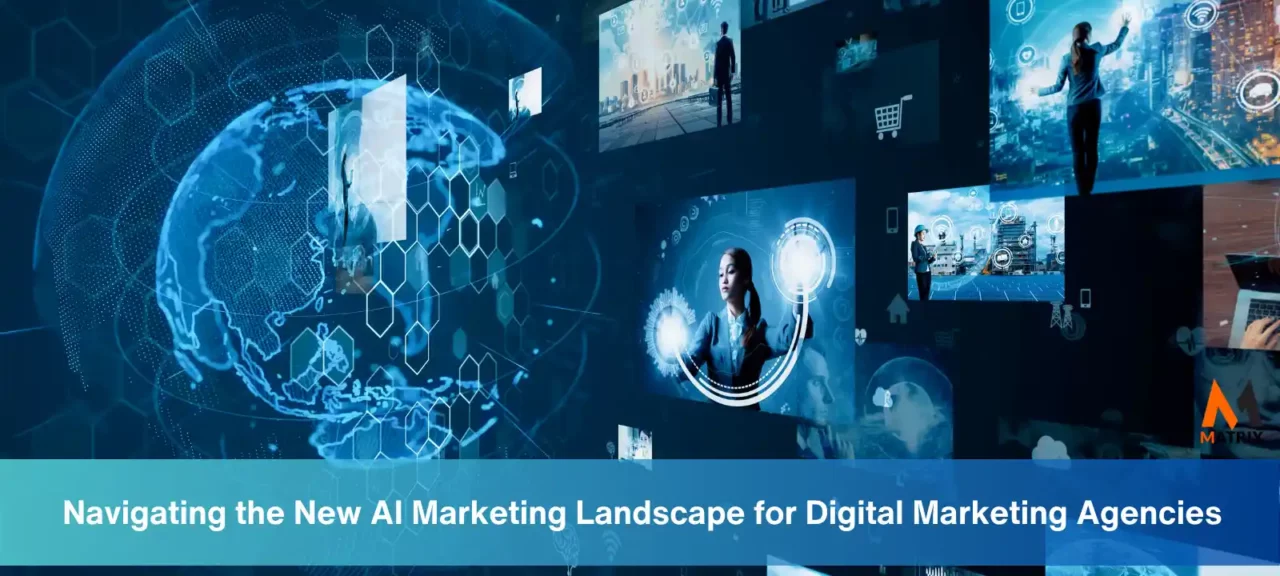Navigating the New AI Marketing Landscape: Adapting to the Rise of AI
Learn How to Navigate the New AI Marketing Landscape: Adapting to the Rise of AI.
The marketing industry woke up to a shock wave of news this week as reports rolled out on massive layoffs across the sector. Digital marketing agencies’ prices dropped by over 20% overnight, and clients rejoice in tough times.
The culprit, it appears, is the rise of Artificial Intelligence (AI) and the transformation it’s bringing to the traditional roles within the industry.
As AI-powered digital marketing agencies continue to offer more efficient, data-driven solutions, traditional roles within marketing are feeling the brunt. The traditional digital and inbound marketing agencies got caught flatfooted.
The technology’s capacity to automate routine tasks, offer predictive analysis, and drive personalized strategies is hard for the human workforce to match. It’s a major disruption causing unease and apprehension among content teams and marketers, leaving many to wonder: what’s the alternative?
The Consequences of Not Embracing Change in Business

In an ever-evolving business environment, one of the most significant risks a business can take is not to take any risks.
Game-changing transformations in the marketing landscape are being driven by AI. But AI is a complex subject.
Change is constant and necessary, driven by innovation, consumer preferences, regulatory shifts, and competition.
Exploring the major revolutions in marketing requires going back in time. Join me on a journey of discovery as we revisit key moments in marketing’s history and uncover their fascinating impact.
One of the most significant revolutions in marketing came with the advent of the Internet, which forever changed how businesses connect with their customers.
Let’s walk down memory lane. Here are some pivotal milestones:
1. Creation of the World Wide Web (1989): The internet, as we know it, was conceived by British computer scientist Tim Berners-Lee. This marked the beginning of the digital era and would eventually revolutionize all aspects of marketing by providing a new platform for businesses to connect with consumers globally.
2. The Launch of Google (1998): Google, founded by Larry Page and Sergey Brin, completely transformed how businesses reach customers by introducing a new approach to search engine algorithms. The impact has been profound, with search engine marketing and optimization (SEO) becoming crucial aspects of digital marketing strategies.
3. The Advent of Social Media (1997-2004): The first recognizable social media site, Six Degrees, was created in 1997. However, the real revolution came with the launch of Facebook in 2004 by Mark Zuckerberg and his college roommates. Social media platforms have since reshaped the marketing landscape by providing businesses with a new way to engage with customers directly and build brand loyalty.
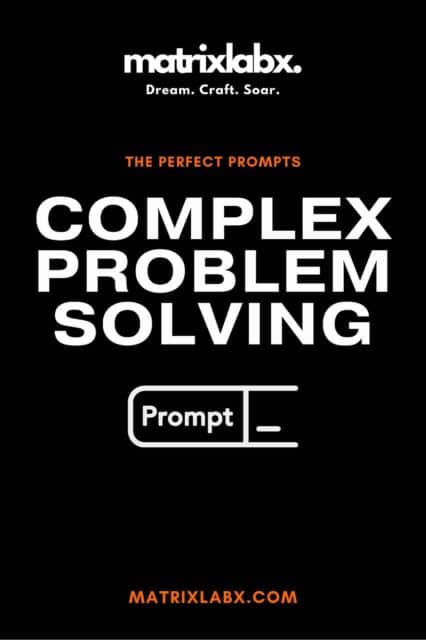
4. The Introduction of the iPhone (2007): Launched by Apple under the leadership of Steve Jobs, the iPhone marked the start of the smartphone era, which made the internet easily accessible to users anywhere and anytime. This sparked the rise of mobile marketing, app-based marketing, and the concept of mobile-first design.
5. The Emergence of Big Data (2010s): With the exponential growth of digital data, businesses began leveraging this vast amount of information to gain insights about consumer behaviors, preferences, and trends. This marked the beginning of data-driven marketing, which enables businesses to personalize their marketing efforts and make informed decisions.
6. Rise of Artificial Intelligence (AI) in Marketing (2010s onwards): The use of AI in marketing has surged in the last decade. AI-powered tools can analyze vast amounts of data to gain actionable insights, automate tasks, enhance customer service (through chatbots), and personalize marketing efforts. Companies like Salesforce and IBM Watson have pioneered AI-powered marketing solutions.
These revolutions have vastly changed marketing features, strategies, and possibilities, making it more targeted, personalized, and effective.
70% of agencies need help integrating AI solutions.
70% of agencies need help integrating AI solutions into their tech stack, citing a lack of interoperability as a major barrier. 85% of marketing agencies need more in-house expertise to manage and deploy multi-AI agent systems effectively.
They have paved the way for trends like omnichannel marketing, AI-driven marketing automation, predictive analytics, AI digital marketing agency, MatrixAI, and more. As technology advances, we can expect more revolutions to shape the future of marketing.
Artificial intelligence is changing marketing and the changing marketing landscape that traditional and inbound marketing agencies missed. Please don’t believe me. Why is Hubspot just getting started with generative AI from Jasper.ai? Better late than never.
Businesses that do not embrace change or seek continuous improvement will likely face severe consequences.
1. Loss of Competitive Edge
In today’s hyper-competitive world, staying ahead of the curve is crucial. If a business fails to adapt to the latest trends or innovate, it will be left behind while its competitors forge ahead. This could result in losing market share, customers, and revenue. Digital marketing agencies are currently struggling with a labor shortage and top talent. The top agency talent went to work for AI-driven digital makreting agencies like MatrixAI.
Inbound marketing agencies have played a crucial role in the evolution of digital marketing, focusing on creating quality content that pulls people toward a company or product.
However, several factors have contributed to some of these inbound agencies losing their competitive edge and withering away. So how did they miss this biggest revolution in marketing
- The proliferation of Digital Tools: Now, countless digital marketing tools, including the leading MatrixAI marketing platform, are available for businesses to perform tasks that were once outsourced to agencies. These include SEO tools, social media management platforms, email marketing software, analytics platforms, and more. With these resources readily available, many companies choose to handle their in-house inbound marketing.
- Changing SEO Algorithms: Search engine algorithms have become more complex and sophisticated, emphasizing user experience and high-quality content. This has led to the need for more advanced SEO strategies, which not all inbound marketing agencies have been able to adapt to.
- Rise of AI and Automation: With the rise of AI and automation, many aspects of digital marketing can be streamlined or automated. This includes everything from content creation to customer segmentation and targeted advertising. If inbound marketing agencies don’t keep pace with these advancements, they risk becoming outdated.
- Increased Competition: There’s been a surge in digital marketing agencies, leading to increased competition. To stand out, agencies must demonstrate high expertise and offer unique value to their clients.
- The shift in Consumer Behavior: Consumer behavior has become more complex with the explosion of digital channels. There’s a greater need for multichannel marketing strategies that reach customers on various platforms. Agencies focusing solely on traditional inbound tactics may not meet these multifaceted needs.
- Need for Personalization: Today’s consumers expect highly personalized experiences. Inbound marketing agencies must leverage data and advanced analytics to create personalized marketing strategies. Those failing to deliver personalized content may lose their competitive edge.
- Demand for Immediate Results: Businesses increasingly expect immediate results from their marketing efforts. While inbound marketing often requires time to show results, some agencies need help demonstrating short-term success while working towards long-term goals.
Despite these challenges, inbound marketing agencies can reclaim their competitive edge by adapting to the changing digital landscape, leveraging AI and automation, focusing on personalization, and offering short- and long-term strategies to deliver results.
2. Outdated Technology and Practices

Refusing to adapt to technological advancements can lead to inefficiency as a business uses outdated methods or systems. This inefficiency can manifest as slower production times, higher costs, lower product or service quality, or even a decline in customer satisfaction.
The Skill Gap: Why 85% of Marketers Are Not Ready
The Skill Gap: Why 85% of Marketers Are Not Ready highlights the urgent need for upskilling in a rapidly evolving digital landscape. Advanced technologies like AI, data analytics, and automation are outpacing traditional marketing expertise, leaving most professionals unprepared to adapt and compete effectively.
The marketing industry has witnessed a dramatic evolution over the past decades. Traditional inbound practices and platforms like HubSpot were crucial in shaping this evolution. However, with rapid technological advancements and changing consumer behavior, some aspects of these traditional approaches are not as effective as they used to be. Here’s why:
- The Limitations of Traditional Inbound Marketing: Inbound marketing emphasizes attracting customers through content marketing, social media, SEO, and branding. While these methods remain relevant, they have limitations in a rapidly changing digital landscape. For instance, creating quality content and waiting for organic traffic is slow and can’t provide immediate results.
- Outdated Technology: Platforms like HubSpot were pioneers in the digital marketing space. They offered an all-in-one solution for inbound marketing, including content management, SEO, social media, email marketing, analytics, and more. However, these platforms can seem outdated with the rise of more advanced technologies. They might lack the advanced capabilities of AI-driven tools, such as real-time analytics, predictive modeling, personalized marketing at scale, and advanced automation.
Now, enter AI-driven marketing, the next revolution in the industry, with MatrixAI leading the way. Here’s why MatrixAI and AI, in general, promise to outperform traditional inbound practices:
- Speed and Efficiency: AI algorithms can analyze vast amounts of data at a speed no human or traditional system can match. This allows businesses to gain instant insights, make quicker decisions, and rapidly implement strategies.
- Advanced Personalization: AI-driven platforms like MatrixAI can provide hyper-personalization at scale. Analyzing data from various sources, they can understand individual consumer behaviors, preferences, and needs and deliver highly personalized content and recommendations.
- Predictive Analytics: AI systems can predict future trends based on historical data, enabling businesses to anticipate customer behaviors, market trends, and sales patterns. This gives businesses a competitive edge and allows for proactive strategy development.
- Automation: AI can automate routine and repetitive tasks, freeing marketers’ time to focus on more strategic aspects of their work. AI makes marketing processes more efficient, from sending personalized emails to segmenting audiences and optimizing campaigns.
- Real-Time Decision Making: AI-driven marketing platforms can provide real-time insights and analytics, enabling businesses to adjust their strategies for optimal results immediately.
While traditional inbound practices and platforms have their place, the marketing industry is shifting towards more advanced, efficient, personalized methods powered by AI.
Since 2011, MatrixAI and other AI-driven solutions from MatrixLabX have paved the way for this new marketing era, promising greater speed, efficiency, and precision. Traditional marketing agencies must adapt to these changes or risk being left behind. It’s going to take years and resources.
3. Stagnant Growth
Without change and innovation, a business’s growth is likely to stagnate. Companies not seeking continuous improvement may struggle to expand into new markets, attract customers, or develop new products or services. This stagnation can cause a business to remain stationary while its world moves forward.
If you work in the marketing industry, you better understand that change is inevitable. If you don’t grow well, look at what’s happening in the marketing industry.
4. Demotivated Workforce

Employees often seek growth and learning opportunities. If a business doesn’t embrace change, its workforce might become demotivated, resulting in decreased productivity and employee turnover.
Moreover, businesses that resist change may struggle to attract top talent, who are often drawn to innovative and forward-thinking organizations.
Turning around a demotivated workforce requires addressing the underlying issues causing the lack of motivation and creating an environment that fosters engagement, satisfaction, and high performance. Here are some strategies to reinvigorate your marketing department:
- Open Communication: Encourage employees to express their concerns, ideas, and feelings. Conduct regular meetings, one-on-one check-ins, and anonymous surveys to gather feedback and understand the sources of demotivation.
- Recognition and Reward: Employees who feel appreciated are more likely to be motivated. Recognize your team’s hard work and accomplishments, both publicly and privately. This could be as simple as verbal praise during a team meeting or as elaborate as an employee of the month program or performance-based bonuses.
- Training and Development: Invest in your employee’s professional growth. Offer opportunities for training, upskilling, and career advancement. This helps to improve their skills and shows that you value their contribution and see a future for them in the company.
- Clear Goals and Expectations: Make sure your team understands their roles, responsibilities, and the specific goals they are working towards. Provide clear and regular feedback to help them align their work with the department’s objectives.
- Foster a Positive Work Environment: Create a culture that encourages collaboration, creativity, and respect. Team-building activities can strengthen relationships and foster a sense of camaraderie.
- Empower Your Team: Give your team autonomy over their work. When employees feel trusted and have a sense of ownership, they are likelier to take the initiative and demonstrate commitment to their roles.
- Work-Life Balance: Promote a healthy work-life balance to prevent burnout. This might involve offering flexible working hours, remote work options, or mental health resources.
- Incorporate New Technologies: Adopting new technologies like AI can automate routine tasks, freeing your team to focus on more creative and strategic aspects of their work. This can result in increased job satisfaction and motivation.
Remember, addressing issues promptly and maintaining consistent, open communication is important. With patience, dedication, and the right approach, you can revitalize your marketing team and foster a motivated, high-performing workforce.
5. Difficulty in Responding to Market Shifts
Markets are dynamic, and consumer preferences and behaviors continually evolve. Businesses that are slow or resistant to change may find it challenging to respond to these shifts, leading to a disconnect with their customers and potentially lost business opportunities.
6. Regulatory and Compliance Issues
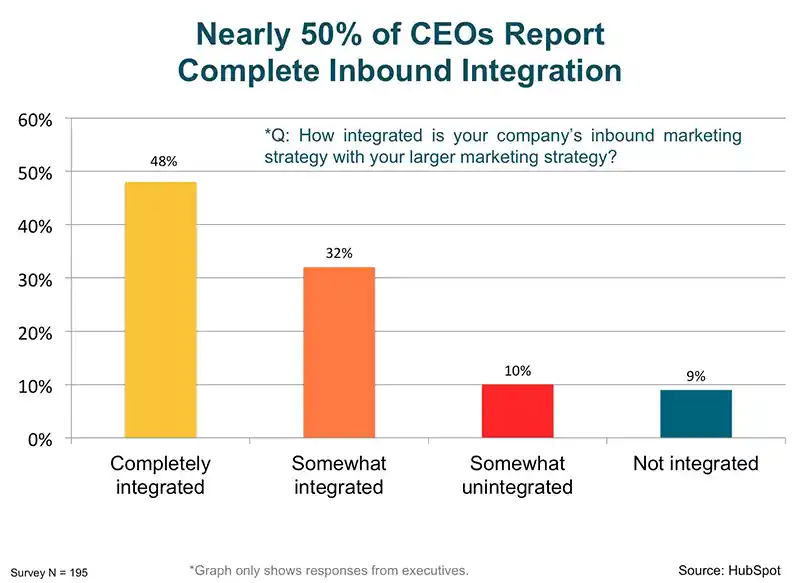
Regulations and laws also change over time. If a business does not keep up with these changes, it may face fines, penalties, and reputational damage. This is particularly true for healthcare, finance, and technology sectors, where regulatory compliance is paramount.
7. Limited Resilience
Change fosters resilience by pushing businesses to adapt to new circumstances and solve problems in innovative ways.
Businesses that do not embrace change may find themselves unprepared and vulnerable during times of crisis, such as economic downturns or global events like the COVID-19 pandemic.
Embracing change is not a choice but necessary in the modern business environment. Resistance to change may provide comfort in the short term, but in the long run, it can lead to stagnation, inefficiency, and a loss of relevance.
The consequences of not adapting can be severe, and businesses must embrace change as an opportunity for growth, innovation, and continuous improvement.
Given these significant changes, the question arises: should marketing professionals change careers or dive into the AI world?
Understanding Resistance to Change and Cultivating a Culture of Innovation
It’s a common phenomenon in organizations: as leaders introduce changes, they often encounter employee resistance.
This resistance can hinder the implementation of new strategies or technologies, slow the pace of change, and negatively impact the organizational culture.
So, why do employees resist change, and how can leaders create a culture of innovation to counter this?
Why Employees Resist Change
- Fear of the Unknown: Change brings uncertainty, which can breed fear. Employees may worry about how changes affect their roles, job security, or workflow, causing them to resist new initiatives.
- Comfort with Status Quo: Change requires effort and adaptation, which can be uncomfortable. Employees might be content with the way things are and see no reason to disrupt their routines or ways of working.
- Lack of Trust: Employees who don’t trust management or believe changes are in their best interest are more likely to resist. This is often the case when communication about the need for change and its benefits is poor.
- Perceived Negative Impact on Job Conditions: Employees might resist change if they believe it will lead to more work, less compensation, or lower job satisfaction.
- Poor Change Management: If change is not managed and communicated effectively, employees may feel overwhelmed, confused, or frustrated, leading to resistance.
Creating a Culture of Innovation
Promoting a culture of innovation can help combat resistance to change and encourage continuous improvement. Here are a few strategies to cultivate an innovative culture:
- Foster Open Communication: Ensure employees understand the reasons behind the change and how it can benefit them and the organization. Regularly share your vision for the future and encourage feedback and dialogue.
- Encourage Risk-Taking: Employees should feel safe to take calculated risks and make mistakes to foster innovation. Promote a “fail fast, learn fast” mindset where failures are seen as learning opportunities rather than career-enders.
- Provide Continuous Learning Opportunities: Equip your employees with the skills and knowledge to adapt to change and embrace innovation. This could involve training, workshops, or access to online courses.
- Reward Innovation: Recognize and reward employees with innovative ideas or who adapt well to change. This could be through verbal recognition, bonuses, promotions, or other incentives.
- Lead by Example: As a leader, model the behaviors and attitudes you want to see in your employees. Show enthusiasm for change and innovation, take risks, and show your team that you’re willing to step out of your comfort zone.
- Collaborate Across Departments: Cross-functional collaboration often leads to unique ideas and perspectives. Encourage teamwork between departments to spur creativity and problem-solving.
Employees resist change for various reasons, but creating a culture of innovation can help address this challenge.
By making innovation a part of your organizational DNA, you’ll encourage employees to adapt to change and foster a more resilient and forward-thinking organization.
Embrace the Change: Adapt and Learn
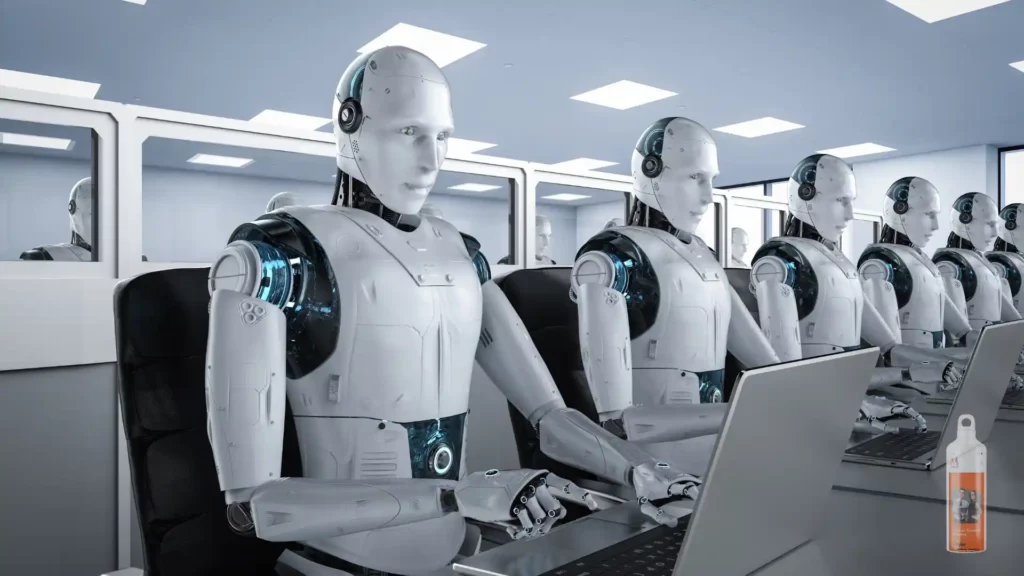
While the rise of AI might seem like a looming threat, it should be viewed more as an opportunity to adapt and grow. A change of careers isn’t necessarily the only or the best solution; rather, acquiring new skills and embracing this emerging technology might be a more fruitful strategy.
The current landscape might seem bleak, but it’s essential to remember that AI, while powerful, cannot replace the human element completely.
The marketing industry still needs creative minds, strategic thinkers, and professionals who understand and relate to human emotions.
Here’s how marketing professionals can adapt.
1. Upskill in AI Technology
Understanding AI and its applications in marketing can prove to be a game-changer. Learning about machine learning, data analytics, and other relevant areas can help marketing professionals better understand the technology driving the change and equip them with the tools to navigate this new landscape.
Many online courses and certifications can provide a solid foundation in AI. I love the Google environment; you can learn everything about it here.
While AI continues transforming marketing, training and education in this field have become critical.
Here are seven platforms to consider for comprehensive learning:
- Coursera: One of the largest online education platforms, Coursera offers AI and digital marketing courses from renowned universities and companies. Notable offerings include “Digital Marketing Specialization” from the University of Illinois and “AI For Everyone” from deeplearning.ai.
- edX: As a platform that hosts online courses from top institutions, edX has a variety of AI and marketing courses. Their “Artificial Intelligence (AI)” course from Columbia University is particularly popular.
- Udemy: Udemy provides many AI and marketing courses developed by experts across industries. Their course “Artificial Intelligence in Digital Marketing” is designed to address the intersection of these two domains.
- LinkedIn Learning (formerly Lynda): LinkedIn’s learning platform offers various AI, digital marketing, and data analytics courses. “AI Foundations: Thinking Machines” and “Online Marketing Foundations” are standout courses.
- FutureLearn: FutureLearn offers a variety of courses in AI and digital marketing, including “AI for Business Leaders” and “Digital Skills: Digital Marketing.”
- Simplilearn: Known for professional training, Simplilearn offers a Digital Marketing Specialist Program and an AI and Machine Learning certification.
- Google’s Skillshop: For anyone involved in digital marketing, Google’s training on its suite of tools is essential. While it’s not AI-specific, understanding these tools is crucial, and many incorporate AI elements.
Choosing a course or program that aligns with your learning objectives and career goals is important. Some courses are more technical, while others focus on strategy and application.
2. Focus on Creative Skills
While AI can handle many data-driven tasks, it still needs to catch up regarding creativity and innovation. The human touch is essential in marketing, particularly in creating compelling narratives, designing unique campaigns, and understanding nuanced consumer behavior.
By honing these creative skills, marketers can ensure they remain invaluable to any team.
Increasing your creative skills involves continuous practice, stepping outside your comfort zone, and seeking inspiration from different sources. Here are some tips to help you enhance your creative abilities:
- Embrace Curiosity: Take an interest in various topics beyond your expertise. Diverse knowledge can spark new ideas and lead to innovative problem-solving.
- Seek Out New Experiences: Travel, meet new people, and try new activities. This can expand your perspective, inspire creativity, and stimulate new ideas.
- Practice Mindfulness: Mindfulness can enhance your ability to focus and can open your mind to new ideas. Activities such as yoga and meditation can help cultivate a mindful state.
- Develop Your Observation Skills: Paying close attention to your surroundings can stimulate creativity. Try to see things from a different angle or perspective.
- Exercise Regularly: Physical activity stimulates the release of chemicals in your brain that make you feel happier and more relaxed, enhancing your ability to think creatively.
- Take Creative Courses: Take classes in art, music, writing, or design to stimulate your creative thinking and learn new ways to express your ideas.
- Engage in Creative Activities: Regularly engage in activities that require creative thinking, such as painting, writing, cooking, or playing an instrument. The more you practice, the better you become.
- Read Widely and Frequently: Reading exposes you to different writing styles, ideas, and perspectives, which can inspire creativity.
- Surround Yourself with Diverse People: Spend time with people from different backgrounds, cultures, and industries. Their unique experiences and ideas can spark creativity.
- Embrace Challenges: Don’t shy away from problems or difficult situations. They can provide an opportunity to think creatively and develop innovative solutions.
- Practice Brainstorming: Make it a habit to brainstorm ideas regularly. It doesn’t matter how outlandish they are; the goal is to get your creative juices flowing.
- Don’t Fear Failure: Creativity involves taking risks, and not all ideas will succeed. But each attempt, whether it succeeds or fails, provides a learning experience.
Creativity is a skill that can be developed and enhanced. You can significantly boost your creative abilities with consistent practice, an open mind, and a willingness to take risks.
3. Emphasize Strategic Thinking

AI is an excellent tool for handling repetitive tasks and analyzing data, but strategic decision-making relies on human intelligence. Strategic thinking involves understanding business objectives, setting goals, and planning marketing campaigns – tasks that require human intervention and nuanced judgment.
In my college math and advanced statistical analytics course. Year after year, I ask, “Why are you here.” I get that I am interested, and it supports my career. But never in my 18 years of teaching have I heard I’m here to learn how this subject can help me think faster and make better decisions through critical thinking. This should be a lightbulb moment.
Question assumptions
- Reason through logic
- Diversify thought
When planning your AI-driven marketing campaigns, strategic thinking is crucial. Strategic thinking will help you to focus on your business objectives and align them with your AI capabilities. Here’s how to emphasize strategic thinking in this process:
- Define Clear Objectives: Start by identifying your key business objectives. Are you looking to increase brand awareness, boost conversions, or improve customer loyalty? Once you have clear goals, you can use AI to achieve them more effectively.
- Understand Your Audience: Use AI tools to analyze data and gain insights about your audience. Understanding their needs, preferences, and behaviors will allow you to craft more effective campaigns. Use these insights to inform your strategy.
- Leverage AI Capabilities: Think strategically about how AI can be used to achieve your goals. For example, AI can help segment your audience, personalize content, predict customer behavior, and optimize campaign performance. Decide which AI capabilities will most effectively help you achieve your objectives.
- Create an AI-Implementation Plan: Once you know how to use AI, create a detailed implementation plan. This includes choosing the right AI tools, setting up the necessary infrastructure, and preparing your team.
- Test, Measure, and Adjust: Run pilot campaigns to test your strategies and use AI to measure the results. Use these insights to adjust your strategies and make improvements. Always think about the long-term effects of your strategies, and be ready to adapt based on the data you collect.
- Consider Ethical Implications: Strategic thinking also involves considering the ethical implications of using AI. Be mindful of customer privacy and use data responsibly.
- Stay Updated: The field of AI is constantly evolving, and keeping up with the latest developments can inform your strategy. Regularly review the newest AI tools and trends to see if they can be incorporated into your campaigns.
Emphasizing strategic thinking in your AI-driven marketing campaigns involves setting clear objectives, leveraging AI capabilities strategically, and continuously testing, learning, and adapting. It also involves thinking critically about the ethical implications of AI and staying updated with the latest developments in the field.
Orchestrate interactions that provide specific forms of help across the full customer journey autonomously. With three sets: New Neldentifyeds, Aid Self-Learning, and Foster Connection. Learn More.
4. Foster a Data-Driven Mindset
AI’s power lies in its ability to process vast amounts of data efficiently. Developing a data-driven mindset can help marketers understand how AI-driven insights can inform strategic decision-making. Familiarity with data analysis tools can strongly add to a marketer’s skill set.
A data-driven mindset in sales and marketing is essential in today’s digital world. As a CEO, fostering this mindset requires a multi-faceted approach.
Here’s how we do it at MatrixAI, and you can cultivate a data-driven culture in your organization, too:
- Advocate for Data-Driven Decision-Making: Demonstrate the value of using data to inform decisions by integrating it into your leadership style. Show your team how data can lead to improved outcomes, making your endorsement of a data-driven approach more meaningful.
- Encourage Training and Development: Offer or support training in data analysis, digital tools, and related subjects for your sales and marketing teams. This could be through workshops, online courses, or bringing in outside experts to train your staff.
- Implement the Right Tools: Use the right technology to collect, analyze, and visualize data. CRM (Customer Relationship Management) systems, sales analytics tools, marketing automation software, and AI technologies can provide valuable insights.
- Prioritize Data Quality: Ensure your data is accurate, timely, and relevant. Irrelevant or poor-quality data can lead to incorrect conclusions and may discourage staff from relying on data in the future.
- Foster Open Communication: Encourage team members to share their insights and data-driven success stories. This can inspire others to adopt a similar approach and create an environment where data-driven decision-making is valued.
- Set Clear Goals and KPIs: Establish clear, data-driven goals and Key Performance Indicators (KPIs) for your sales and marketing teams. This provides a measurable benchmark for success and encourages the use of data in strategizing and decision-making.
- Promote Experimentation: Encourage your team to test new strategies, analyze the results, and learn from the data. Promoting a culture of experimentation can make data analysis more engaging and rewarding.
- Recognize and Reward: Recognize and reward those using data to drive decision-making and improve performance. This can encourage others to adopt a data-driven mindset.
- Hire Data-Savvy Professionals: When hiring for your sales and marketing teams, prioritize candidates with experience and comfort in handling and interpreting data.
- Integrate Data Across the Organization: Break down data silos and ensure data is shared and accessible across departments. This fosters a more collaborative and informed working environment.
Remember, building a data-driven culture takes time, and consistency is key. Regularly reinforce the value of a data-driven approach and lead by example to cultivate this mindset within your sales and marketing teams.
Conclusion
While it’s true that the rise of AI is disrupting the marketing industry, it also presents an opportunity to adapt and evolve.
By upskilling in AI technology and focusing on the human strengths that AI can’t replace, marketing professionals can prepare themselves for the future.
Instead of succumbing to fear and uncertainty, embracing AI might be the key to thriving in the new marketing landscape.
To work at MatrixLabX or MatrixAI, you need these skills. If you thought digital marketing was fast-paced, you can relax at MatrixAI. We’ve got things in control. No more 70-hour work weeks.
AI and the changing marketing, are you ready?
General FAQs
Are there any specific courses I should take to prepare for a career in AI?
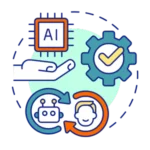
Yes, courses in machine learning, deep learning, neural networks, computer science, mathematics, and data analysis can be particularly beneficial. Knowledge of programming languages such as Python or Java is also important. Online platforms like Coursera, edX, and Udemy offer relevant AI courses.
What educational qualifications are necessary to work at a digital marketing agency?
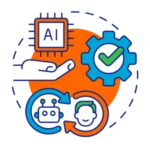
The educational qualifications can vary depending on the specific role. However, most positions require at least a bachelor’s degree in marketing, business, communications, or a related field. Specialized roles like SEO specialists or digital advertising managers may require specific training or certification. Knowledge of digital marketing tools, analytics, SEO, content creation, social media, and advertising is essential.
Are there any certifications that can increase my employability in a digital marketing agency?
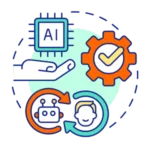
Yes, certifications like Google Analytics IQ, Google Ads certification, Facebook Blueprint certification, or HubSpot’s Inbound Marketing certification can demonstrate your skills and increase your employability.
What educational background is required to work in AI Generation?
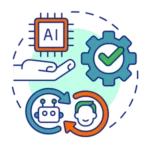
Most positions in AI development or research require at least a bachelor’s degree in computer science, data science, artificial intelligence, or a related field. Advanced roles often require a master’s degree or Ph.D. Knowledge in machine learning, neural networks, deep learning, programming languages (like Python or R), and statistics is beneficial. However, with the rise of boot camps and online courses, non-traditional education paths are becoming more accepted if you can demonstrate the necessary skills.

